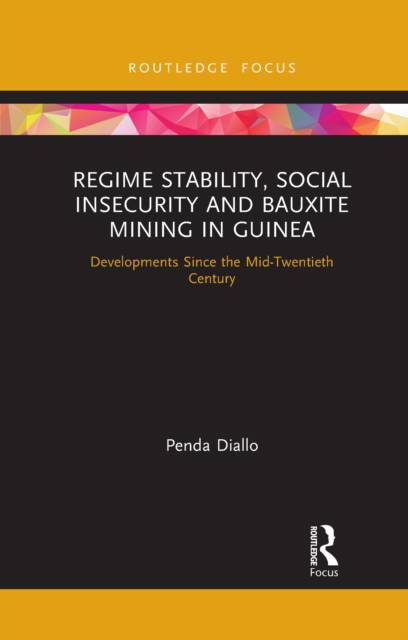
- Afhalen na 1 uur in een winkel met voorraad
- Gratis thuislevering in België vanaf € 30
- Ruim aanbod met 7 miljoen producten
- Afhalen na 1 uur in een winkel met voorraad
- Gratis thuislevering in België vanaf € 30
- Ruim aanbod met 7 miljoen producten
Regime Stability, Social Insecurity and Bauxite Mining in Guinea
Developments Since the Mid-Twentieth Century
Penda DialloOmschrijving
This book explores how bauxite mining has affected local and national political dynamics in Guinea over the past 55 years, providing an overview of mining interactions with social, economic and political spheres.
Guinea is amongst the world's top producers of bauxite, and the country's rich mineral presence has numerous implications on local communities and national policy. Guinea is an interesting and highly relevant case study in assessing the impact of bauxite mining on regime stability and social insecurity. The author offers a clear understanding of the role of mining during the Touré and Conté regimes and analyses how changes since the election of Condé in 2010 have affected the socio-political and economic development of Guinea. The author also offers analysis on how bauxite mining has led to the emergence of new forms of social contracts, sustained by mining companies instead of the state. Finally, the book argues that understanding the stabilising and destabilising potential of mining is key to ensuring long-term, sustainable, stable and inclusive growth of mineral-resource-rich countries. The book concludes by highlighting the relevance of the findings in Guinea for the wider African extractives sector.
The book will be of interest to a wide range of scholars, including those working in the areas of African studies, political science, political economy, sustainable development and corporate social responsibility. The book will be relevant for academics, business actors, NGOs, policy-makers and students interested in the African mining sector.
Specificaties
Betrokkenen
- Auteur(s):
- Uitgeverij:
Inhoud
- Aantal bladzijden:
- 144
- Taal:
- Engels
- Reeks:
Eigenschappen
- Productcode (EAN):
- 9781032087498
- Verschijningsdatum:
- 30/06/2021
- Uitvoering:
- Paperback
- Formaat:
- Trade paperback (VS)
- Afmetingen:
- 140 mm x 216 mm
- Gewicht:
- 172 g

Alleen bij Standaard Boekhandel
Beoordelingen
We publiceren alleen reviews die voldoen aan de voorwaarden voor reviews. Bekijk onze voorwaarden voor reviews.











